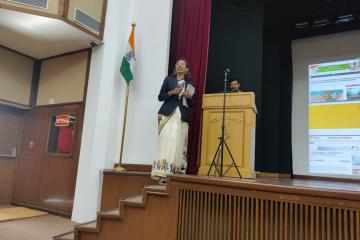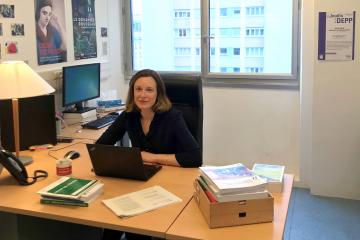
Alumni Voices from Government: Jasmine Shah ‘16, Dialogue and Development Commission, Delhi Government

Formerly the deputy director of J-PAL South Asia, Jasmine Shah ‘16 now leads public policy design and implementation at the Dialogue and Development Commission within the Delhi government. He describes the transition from J-PAL to government in this post in the Alumni Voices from Government series.
I currently head the policy think tank of the Delhi government called Dialogue and Development Commission (DDC)—a nascent though fairly unique organisation within state governments in India. The role of DDC spans from helping design effective policies to seeing through implementation bottlenecks, and ensuring effective public communication of key government programmes. For example, DDC has recently drafted Delhi’s Electric Vehicle Policy and is overseeing the implementation of Outcome Budgeting initiative, a government-wide monitoring initiative that tracks 80 percent of budgetary outlay through 2,500+ output and outcome indicators.
In my present role, I work closely with the Chief Minister and the entire Council of Ministers to support a critical set of policy reforms in the Delhi government. I moved to this role in late 2018, two years after leaving J-PAL South Asia and serving in the interim as an advisor to the Deputy Chief Minister, whom, incidentally, I met for the first time when presenting J-PAL’s lessons in Education deck over a three-hour long meeting.
Leaving the world of J-PAL and entering the world of governance and politics in India has been a change at every single level, from advocating evidence-based policies to now being driven by the desire to reliably deliver the most basic public services that people expect from their governments but rarely get—quality government schools, hospitals, clean water, efficient public transport and clean air. Where good data or evidence is a boon, but you can’t afford to wait for it. Where the sheer scale of challenges, often politically motivated, to implementing anything are so huge that nuanced conversations on policy design come few and far between.
But if there’s one thing that has remained a constant through this transition is how deeply committed my colleagues are to impacting lives at scale. While it may come naturally to those at J-PAL, it can be rare for a political setup.
The last four years have shown me that while rigorous evidence can make a lot of difference, it amounts to little without the political will to invest disproportionately in issues such as education, health or poverty alleviation. This is both in terms of budget—the present Aam Aadmi Party-led Delhi government invests 25 percent of its annual budget in education and 15 percent in health, by far the highest in India—but more so in the time and energy the elected leadership invests in driving change in these areas.
Unfortunately, my experience has been that these can’t be influenced but often come hard-coded into the ideologies or priorities of different political parties. Which brings me to my own personal theory of change, as summed up in my Twitter bio: Believe in the power of honest politics and evidence-based policies. The whole is greater than the sum of its parts.


